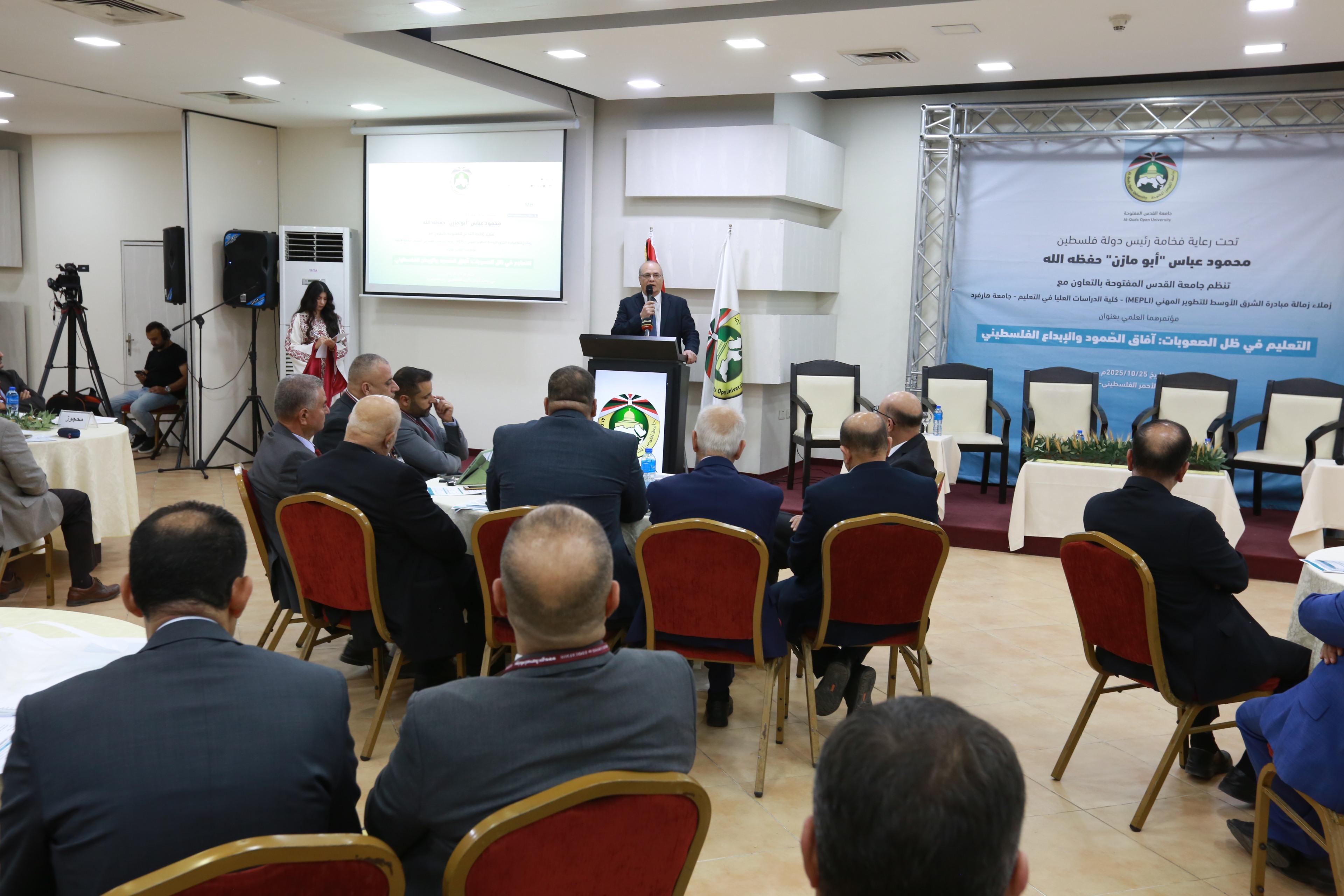
Under the auspices of His Excellency President Mahmoud Abbas, President of the State of Palestine, Al-Quds Open University in cooperation with the Middle East Professional Learning Initiative (MEPLI) – Harvard University organized a scientific conference entitled “Education Amid Challenges: Horizons of Palestinian Resilience and Creativity.” The event was held at the Palestine Red Crescent Society Hall in Ramallah, with the participation of distinguished academics and experts from various Palestinian universities.
The conference aimed to shed light on the challenges facing the education sector in Palestine due to the prevailing political, social, and economic conditions, and to present innovative educational experiences and teaching practices that foster resilience and creativity among Palestinian students.
QOU President Prof. Dr. Ibrahim Al-Sha’er inaugurated the conference and welcomed the participants, paying tribute to the martyrs of Palestine. He affirmed that “the patronage of President Mahmoud Abbas reflects his belief that education is the cornerstone of building the Palestinian state.” He emphasized that QOU has embedded in its mission the commitment to sustaining and enhancing the quality of education through the adoption of modern approaches in open, digital, and applied research-based learning. Prof. Al-Sha’er commended the Palestinian academic community for its remarkable ability to transform challenges into opportunities, emphasizing that QOU continues to reinforce its national and international partnerships to build an education system capable of meeting future needs. Prof. Al-Shaer expressed his pride in the collaboration with MEPLI, describing it as one of the world’s foremost educational institutions.
Dr. Amani Rayyan, Chair of the Organizing Committee, emphasized that the conference reflects QOU’s continuous mission to develop Palestinian education and enhance its resilience through scientific research and international academic partnerships. She also presented an overview of the conference’s objectives and main themes.
MEPLI Director Ms. Shaylyn Carey, spoke via Zoom, and expressed her pride in the partnership with Al-Quds Open University, affirming the importance of international academic cooperation to support Palestinian teachers and students, especially given the multiple challenges the sector faces. She commended QOU’s efforts to promote flexible and innovative learning environments and its progress toward digital transformation. Ms. Carey added that this conference highlights the maturity of the Palestinian educational experience and its capacity for creativity despite the challenges. She also praised the QOU's success in providing an active platform for dialogue and knowledge exchange, which contributed significantly to the conference’s success and engagement. She noted that the conference addressed key topics such as the role of artificial intelligence in education during crises, socio-emotional learning, and innovative teaching strategies, stressing that the insights gained would help participants improve their teaching practices and educational environments. She concluded by expressing her hope to meet participants in person in the near future.
The opening panel discussion, moderated by Prof. Dr. Ma’zouz Alawneh, QOU Vice President for Academic Affairs, brought together presidents of universities, academics, and educators from various national institutions. The discussion explored structural challenges facing Palestinian education and prospects for development amid political, economic, and technological transformations, underscoring the importance of educational equity, teacher and student empowerment, and education as a tool of resistance and nation-building.
The conference featured 23 peer-reviewed research papers presented across four scientific sessions that tackled critical issues shaping the future of education in Palestine. Topics included the use of artificial intelligence in education during emergencies, socio-emotional learning, and pedagogical innovation in times of crisis. Other papers addressed educational leadership in the era of AI, flexible learning, psychological empowerment, and studies on Palestinian women’s experiences in international education.
The conference also included a number of practical workshops combining artistic creativity with pedagogical approaches, conducted by specialists from universities and civil society organizations.
In the closing session, Dr. Azmi Al-Hajj, Deputy Chair of the Scientific Committee, presented the conference recommendations, which emphasized the need to integrate concepts of artificial intelligence and socio-emotional learning into curricula, to develop training programs for teachers in digital education and pedagogical innovation, and to enhance partnerships between Palestinian universities and international institutions for experience exchange and sustainable research capacity building.